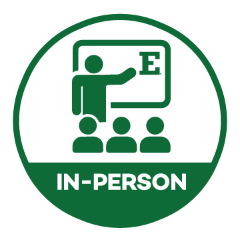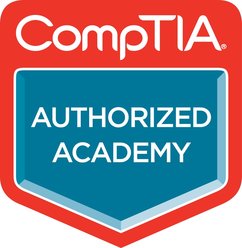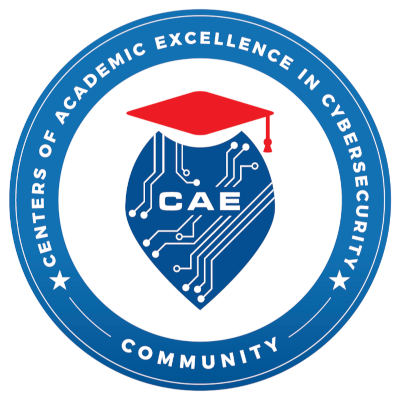About this Program
The Bachelor of Science in Cybersecurity program prepares prospective students with the knowledge and skill set necessary for future computing and cybersecurity professionals to build, maintain and protect networks and computer systems in both government and industry.
The program has been designated by the Department of Homeland Security (DHS) and National Security Agency (NSA) as the Center of Academic Excellence (CAE) in Information Assurance (IA) and Cyber Defense (CD) education.
This is a STEM-designated program (see OPT Extension)
The program, formerly known as "Information Assurance and Cyber Defense," holds accreditation from ABET. The School of Information Security and Applied Computing is presently seeking ABET accreditation for the program under its updated name, "Cybersecurity."
Learn
The program emphasizes the design, integration, administration, hardening, and protection of all types of computer information systems and network infrastructures in modern cyber environments. Students are immersed in solid theories and intensive hands-on practical experiences to enhance their critical thinking and problem-solving capabilities applied to all elements in modern computing disciplines. The curriculum covers:
- Computing and networking theories/practices
- System architecture and administration, integration and troubleshooting
- Cybersecurity threat/risk evaluation
- Incident response analysis and practice
- Network/digital forensics and investigation
- Penetration testing and system auditing
- Cyber laws, legislation, policy/compliance, and project management
Mission Statement
Our mission is to support the computing and cyber security needs of local, regional, and national government and private organization through excellence in education, scholarship and service. We are committed to providing quality educational opportunities to both traditional and non-traditional students and seek to equip our students with the knowledge and skill set necessary for future computing and cyber security professionals to build, maintain and protect networks and computer systems in both government and industry.
Program Educational Objectives
As a framework for the continuous improvement policy, the Assessment Committees has adopted a set of program educational objectives (PEO) that describe the anticipated accomplishments of our graduates 3-5 years after graduation. Information Assurance and Cyber Defense Program’s educational objectives are to produce graduates who:
- Function successfully as professionals by designing, implementing, supporting and evaluating holistic solutions to protect and maintain information security.
- Advance professionally through increasing level of expertise of information technology and cyber security, and/or by transitioning into leadership position in industry, government, and/or education.
- Actively seeking life-long learning through self-study, completion of advanced degree(s), continuing education, and IACD related certification(s)/licensures or other professional development related to their career.
- Demonstrate social and professional commitment to serving the community.
Student Learning Outcomes (SLOs)
Cybersecurity [BS] Student Learning Outcomes (SLOs)
The BS in Cybersecurity program SLOs are adapted from ABET General Criteria 3 for Accrediting Computing Programs, General Criteria 3. The following outcomes must be attained by students upon graduation.
- An ability to apply knowledge of computing and mathematics appropriate to the program’s student outcomes and to the discipline
- An ability to analyze a problem, and identify and define the computing requirements appropriate to its solution
- An ability to design, implement, and evaluate a computer-based system, process, component, or program to meet desired needs
- An ability to function effectively on teams to accomplish a common goal
- An understanding of professional, ethical, legal, security and social issues and responsibilities
- An ability to communicate effectively with a range of audiences
- An ability to analyze the local and global impact of computing on individuals, organizations, and society
- Recognition of the need for and an ability to engage in continuing professional development
- An ability to use current techniques, skills, and tools necessary for computing practice
General Education Requirements
For specific requirements, see General Education or view the General Education Worksheet [PDF].
Major Requirements: 84 hours
Requirements for Graduation
- Only 300-level courses taken at EMU can satisfy major requirements.
- ALL students MUST earn at least 45 credits in the major at the 300-level or above.
- Students must maintain a minimum cumulative EMU GPA of 2.5.
Foundational Requirements: 9 hours
Core Requirements: 75 hours
Minor Requirement: This major does not require a minor.
Program Total: Students must earn a minimum total of 120 credits at the 100-level or above.
Additional Information: See Transfer Agreements.
Advisor Information
General Education (and other university requirements) Advising
Please visit GameAbove College of Engineering and Technology Student Services to make an appointment.
Faculty Advisor
To find your faculty advisor, please see School of Information Security and Applied Computing Advisors.
Critical Graduation Information
Each undergraduate student will be responsible for fulfilling the requirements (or their equivalents) of the Eastern Michigan University catalog in force at the time of their initial registration at a college or university or a subsequent catalog, including the one in effect at the time of their graduation.
In the event an undergraduate student does not complete the degree requirements within seven years of the date of their original registration at a college or university, the student may be required to have their credits re-evaluated by the academic department(s) of their major/minor in keeping with catalog requirements in force during the year of their graduation.
Minimum requirements for all bachelor’s degrees awarded by Eastern Michigan University
Some majors and minors require more than the minimum in one or more of the areas below; students are urged to consult this catalog for the requirements of their particular programs.
- Earn a minimum total of 120 credit hours at the 100-level and above.
- Courses numbered below 100 are not counted toward this degree requirement.
- At most, eight credit hours of physical education (PEGN) activity courses are counted toward this requirement.
- Meet the requirements of the General Education program (see information below), including completing a Writing Intensive (GEWI) course in the student’s major.
- Earn a minimum of 60 credits from a four-year college or university; courses taken at community colleges cannot be used to meet this requirement (Some formal program-to-program articulation agreements modify this requirement. See specific agreements for details).
- Earn a minimum of 30 credits from courses taken at EMU.
- Complete 10 of the last 30 hours for the degree from courses taken at EMU.
- Have a minimum of 30 unique credit hours in their major and 20 unique credit hours in their minor for a total of at least 50 unique credit hours between them. Some majors that require 50 or more hours themselves do not require a minor. A double major automatically satisfies the need for a minor unless one of the two majors requires a specific minor. Students should check the requirements of the selected major in the undergraduate catalog to see if a minor is required.
- Earn no more than 60 credit hours in one subject area (prefix). Credits over the 60 maximum will not be counted toward the minimum of 120 credits required for a bachelor’s degree.
- Earn the minimum number of credits in 300-level and above courses in each major and minor as specified below - these credits must be earned in distinct courses; that is, no course can be used to fulfill this requirement in more than one major or minor.
- Earn a minimum of 6 credits in 300-level or higher courses at EMU in each minor
- Earn a minimum of 9 credits in 300-level or higher courses at EMU in each major that requires a minor.
- Earn a minimum of 15 credits in 300-level or higher courses at EMU in each major that does not require a minor
- Transfer credit will be awarded for courses taken at colleges and universities that are accredited by one of the recognized regional accrediting bodies only if the courses are college-level (equated to 100-level or above at EMU) and the student earned a “C” (or 2.0 on a 4 point scale) or better. Transfer credit may be awarded on a case-by-case basis for college-level courses in which a “C” (2.0) or better was earned at institutions outside the U.S. or at non-accredited U.S. institutions; individual departments/schools conduct the internal review of such courses within EMU, and additional documentation may be required. Please note: EMU awards only credit for transferred courses; grades are not used to calculate an EMU GPA.
- Earn a minimum cumulative GPA of 2.0 in courses taken at EMU to graduate. In addition, a minimum cumulative GPA of 2.0 must be reached in each major and minor. Only courses a student takes at EMU and those applied to their major or minor are used to calculate their major and minor cumulative GPAs. (Note: some programs may require a higher GPA - check with your program advisor.)
General Education Requirements EMU’s General Education Program requires students to choose from a menu of approved courses in several different areas; do not assume that other courses in the same department or similar names will fulfill these requirements. A detailed description of General Education requirements is available in the General Education section of the catalog.
Students who transferred to EMU may have modified general education requirements based on Michigan Transfer Agreement (MTA) or articulation agreements; consult your academic advisor for additional information.
- Earn a minimum total of 120 credit hours at the 100-level and above.
Enrollment and Degree Data
This program's name is changed. Updated enrollment and degree data will be uploaded.
Opportunities
Per the U.S. Department of Labor 2018 handbook, computer and information technology occupations are projected to grow 13 percent from 2016 to 2026, faster than the average for all occupations. The median annual wage for computer and information technology occupations was $84,580 in May 2017, which was higher than the median annual wage for all occupations of $37,690. Graduates are in demand to work in private, public, and government agencies. Recent graduates have held positions at Amazon, Dell SecureWorks, Duo Security, Google, Snapchat, General Electric, and Dominos Corporate.
At a Glance
- Number of credits: 120
- Time to complete: four-year program
Catalog
- Cybersecurity [BS]
- Digital Forensics and Incident Response Minor
- Information Assurance Compliance Minor
- Information Assurance Security Architecture Minor
Resources

Dr. Sean (Xiangdong) Che
Interim Director, Information Assurance and Cyber Defense
- Call: 734.487.0409
- Office: 211 Sill Hall, Ypsilanti, MI 48197





